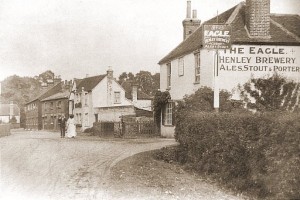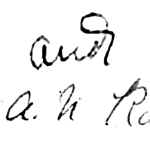Envelope addressed to Miss Crawshaw, 29 etc franked 20 Ja 15
Dated 17th-1-15
Dear Till,
How pleased I was with the parcel which I received alright, which I thought was very good of you. I am glad to hear that you got the P M Gift alright, and if uncle Matt wants the pipe and Tobac he can have it, but I want you to look after the box and card.
Pleased to hear that Doll enjoyed herself along of you and Aunt, yes she wrote me a very nice letter and the Chocolates were very good. Is that oh(?) What she said that she didn’t know if I would be pleased with them.
Yes Till all my things are at Belfast and if you could see your way clear to get them you would be doing me a good turn. Don’t forget to let me know when you are going to get them, I have wrote to Jess and told her that you are going to make arrangements with her for getting them to Brixton.
I have received Bert’s parcel and I have answered it surely he as got the letter by now. No I haven’t heard from Tom for some time now but hope to before long. I expect he is well away at sea now what say you. Please to hear Uncle Matt is taking it out of the knocker.
Well Till we have been having a very trying time lately and that account for me not being able to write before. I haven’t heard any more about the leave but I hope to get it anyway.
Glad to see that you sent Doris a little present. How are you going on alright still mucking in at Stewarts? You say Bert is grieved because they are not going to send him out here, you tell him from me he don’t know where he is best off.
Well Till I am getting on away well as can be expected and still in the pink although I haven’t felt myself this last few days.
Surprised to hear about Dolly staying at Tottenham yes she misses the Green. Now I think this is all the news at present except that things are just about the same here and the weather is still wet and miserable. Remember me to all at home and tell Aunt not to forget to drop a few lines before long so will conclude hoping to hear from you soon.
Your loving Brother
Bid xx
17th January 1915
Now we have confirmation that Frank sent the Princess Mary Christmas Gift Fund Box home and that Uncle Matt got the pipe and tobacco. I wonder what happened to the box? The story I’ve heard, secondhand mind you, about the discovery of these letters, is that they were found bundled up in a tin by my Great Uncle Geoff Debnam. I wonder if they were in the Princess Mary tin?
Frank’s received some chocolate sent from Dolly, his ex-girlfriend. The following section discusses getting Frank’s belongings from Jess in Belfast back to Brixton. I’ve always thought this was just for convenience as that’s where he would take his leave he so hope to get. But can we infer from the previous paragraph, that Frank’s attention is shifting elsewhere and that his ardour for Irish Jess was dampened in the Belgian weather.
Taking it out of the knocker is such a great phrase. I guess it means, seeing as Matt’s a postman, that he hammers away at people’s front doors. It appears that Frank’s mother is a postal worker too, but we haven’t heard about her since the beginning of December. Tellingly, Frank hasn’t even asked after her in his letters home. Uncle Matt appears, over the course of these letters, to be a bit of a sick note when it comes to work. Frank is constantly concerned that Matt’s continuing to work and rather surprised when he is actually in work rather than sick.
Doris Crawshaw had enjoyed her 13th birthday on the 11th January, which explains Frank’s reference to Mabel sending her a “little present”.
The only other curious part of the letter is the reference to “Dolly staying at Tottenham yes she misses the Green”. Is this referring to a different Dolly? A family member who might have moved from Frank Senior, who live on Islington Green at “Stewarts” to the grandparents in Tottenham. Or was it Frank’s ex-girlfriend. It seems a strange coincidence that she would live in both places. Or was Dolly a distant cousin too?
The Dorsets remained in billets for another day. Today was a Sunday in 1915. The 15th Brigade’s diary tells us that the brigade enjoyed “usual church, washing and a rest”. I wonder if they billeted in the lunatic asylum in Bailleul, which was a popular destination for officers and men during the war to strip off their lice-ridden filthy rags and enjoy the hot baths there. In fact, when I get some spare time, I will dedicate an entire post to the asylum as there are lots of references to it in soldiers’ memoirs and books.
Frank admits that “I haven’t felt myself this last few days”. Hopefully a hot bath, fresh clothes and a good sleep out the the rain put a bit of a smile back on his face.

